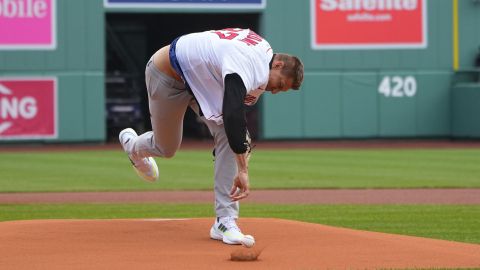 John Farrell slept on it — well, kind of — and he understands the umpires’ rationale.
John Farrell slept on it — well, kind of — and he understands the umpires’ rationale.
The Red Sox dropped Game 3 of the World Series on Saturday in a strange manner. The Cardinals scored the winning run in the bottom of the ninth inning on an obstruction call against Will Middlebrooks, which sent the baseball world, social media users, Red Sox players, — you name it — into a state of shock. Farrell finally had a chance to step back upon leaving Busch Stadium after Game 3, and the Red Sox skipper acknowledged before Game 4 that the umpires simply did what they needed to do.
“It wasn’t a normal night of sleep, I know that,” Farrell told reporters Sunday. “You know what, the call was made correctly. The umpires ‑‑ Jim Joyce, Dana DeMuth — that call was made as it should have been. Probably the more issue personally that I have is with the Type-B obstruction. If there was the ability to have some measure in there in that portion of judgment, judgment on intent, because right now, there is none. It doesn’t matter if there is intent or not. When Will Middlebrooks is lying on his stomach, it’s hard to say that he was intending to impede that runner’s progress.
“So the way the obstruction rule is set up right now, the baserunner can be the aggressor and beneficiary on both sides. They can seek out an infielder, run into him, and benefit by advancing. So yesterday when there’s no intent, given the heightened importance of the game at the time and where we are, you’d like to see possibly the Type-B portion of that rule addressed.”
Middlebrooks was called for obstruction after Allen Craig, who slid into third base, stumbled over the third baseman after jumping up to continue home. There has been a great deal of debate about Middlebrooks’ intent, among other things, but the rule is quite clear.
Rule 7.06(b) states:
(b) If no play is being made on the obstructed runner, the play shall proceed until no further action is possible. The umpire shall then call “Time” and impose such penalties, if any, as in his judgment will nullify the act of obstruction.
Rule 7.06(b) Comment: Under 7.06(b) when the ball is not dead on obstruction and an obstructed runner advances beyond the base which, in the umpire’s judgment, he would have been awarded because of being obstructed, he does so at his own peril and may be tagged out. This is a judgment call.
The issue that many, including Farrell, seem to have about the play is not that the rule was enforced. Rather, the issue lies in how the rule is constructed. Perhaps Major League Baseball will take a look at the rule in the future, but for now, an umpiring crew can’t be expected to throw the rule book out the window just because something extremely rare happened during the World Series. That seemed to be Farrell’s point when he spoke with the media Sunday.
“Once [the umpires] mentioned and determined and explained that it was obstruction, you know‑‑ we’re well aware of the rules,” Farrell said. “And at that point, it’s not so much a judgment call. It’s pretty a straightforward call. We don’t like it, but that’s the rule in which we play under.”
Have a question for Ricky Doyle? Send it to him via Twitter at @TheRickyDoyle or send it here.




